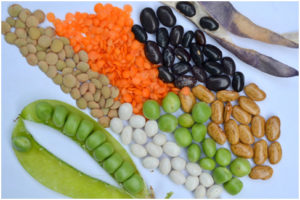Why Does Processed Food Give You Gas?
Author: Dr. Stephen Chaney
 Does it feel like a war is going on in your belly every time you eat? It could be IBD (inflammatory bowel disease). IBD can take several forms, but the two most common are Crohn’s disease and ulcerative colitis.
Does it feel like a war is going on in your belly every time you eat? It could be IBD (inflammatory bowel disease). IBD can take several forms, but the two most common are Crohn’s disease and ulcerative colitis.
What do we know about IBD?
- The symptoms of IBD can make you miserable. They include:
-
- Abdominal pain and cramping.
-
- Diarrhea with occasional bouts of constipation.
-
- Gas and bloating.
-
- Loss of appetite and/or unexpected weight loss.
- There are about 1.6 million Americans with IBD and 70,000 new cases/year.
-
- The prevalence of IBD in the United States has increased by 34% between 2006 and 2016.
- As you might suspect from its name, IBD is a chronic inflammation of the gastrointestinal tract.
-
- It is thought to be caused by “dysbiosis of the gastrointestinal track” (In layman’s terms that means damage to your intestine caused by too many bad bacteria and not enough good bacteria).
-
- There is also a genetic component to the disease. Some people are much more susceptible to IBD than others.
If you watch TV, you know that there are drugs for treating IBD. The ads make them sound like miracle drugs. But if you listen carefully, you also know that these drugs have a long list of side effects. And some of the side effects are pretty scary.
Are There Natural Approaches For Controlling IBD?
 So, if your belly is a bit rumbly, you might be wondering if there is a more natural approach you could take. We know that diet affects the balance between bad and good bacteria in our intestine. Could something as simple as changing your diet, quell the fire in your belly?
So, if your belly is a bit rumbly, you might be wondering if there is a more natural approach you could take. We know that diet affects the balance between bad and good bacteria in our intestine. Could something as simple as changing your diet, quell the fire in your belly?
While the answer seems obvious, it has been hard to prove. The results of previous studies have been inconclusive. That is because previous studies:
- Included too few people. 1.6 million people in the US with IBD may sound like a lot, but that represents only 0.4% of the population. Unless you have a really big study, there won’t be enough people who develop IBD to give you statistically significant results.
- Were too short. IBD doesn’t develop overnight.
- Did not include a diverse enough population. Previous studies were confined to individual countries or specific regions within a country.
This study (N Narula et al, British Medical Journal, 2021;374:n1554) was designed to overcome the limitations of previous studies. It also looked at the effect of diet on IBD from a different perspective than most previous studies.
- It did not focus on the effect of individual foods on IBD. Since consumption of processed foods is known to affect the population of intestinal bacteria, the authors of this study asked whether processed food consumption might influence the likelihood of developing IBD.
How Was The Study Done?
 The authors of this study used data collected from the PURE (Prospective Urban Rural Epidemiology) study between January 1, 2003, and December 31, 2016. The PURE study collected data from a very diverse population. Specifically, it collected data from 21 low-, middle-, and high-income countries across 7 geographical regions (Europe, North America, South America, Africa, Middle East, South Asia, Southeast Asia, and China).
The authors of this study used data collected from the PURE (Prospective Urban Rural Epidemiology) study between January 1, 2003, and December 31, 2016. The PURE study collected data from a very diverse population. Specifically, it collected data from 21 low-, middle-, and high-income countries across 7 geographical regions (Europe, North America, South America, Africa, Middle East, South Asia, Southeast Asia, and China).
- This study followed 116,087 adults aged 35-70 years (average age 50, percent women = 60%) in the PURE study for an average of 9.7 years. During that time, 467 participants (0.4%) developed IBD.
- All participants filled out a baseline food-frequency questionnaire that had been designed and validated for foods specific to their country.
- Participants were asked if they had a diagnosis of Crohn’s disease or ulcerative colitis as part of an annual follow-up questionnaire. To assure the accuracy of these answers they were validated with medical records whenever possible.
Does Processed Food Give You Gas?
 Does processed food give you gas? Does it give you abdominal pain, diarrhea, and bloating? In short, does it give you IBD? That is the question this study was designed to answer. Here are the results of the study:
Does processed food give you gas? Does it give you abdominal pain, diarrhea, and bloating? In short, does it give you IBD? That is the question this study was designed to answer. Here are the results of the study:
- When comparing those eating the most processed food (≥5 servings/day) to those consuming the least (≤1 serving/day), processed food consumption increased the risk of developing IBD by 1.82-fold. This finding was equally true for:
-
- Both Crohn’s disease and ulcerative colitis.
-
- Adults <50 and adults >50.
-
- Every region of the world included in the PURE study.
- When the investigators looked at different categories of processed foods:
-
- Processed meat intake increased the risk of IBD by 2.07-fold.
-
- Soft drink intake increased the risk of IBD by 1.94-fold.
-
- Refined sweetened food intake increased the risk of IBD by 2.58-fold.
-
- Salty food and snack intake increased the risk of IBD by 2.06-fold.
- When the investigators looked at different categories of unprocessed foods:
-
- White meat, red meat, dairy, starchy foods, fruits, vegetables, and legumes had no effect on the risk of developing IBD.
-
- Sodium intake (as measured by urinary excretion of sodium) also had no effect on the risk of developing IBD.
Why Does Processed Food Give You Gas?
 You may be wondering why does processed food give you gas – and other symptoms of IBD.
You may be wondering why does processed food give you gas – and other symptoms of IBD.
The simplest explanation is that whole grains, unprocessed fruits & vegetables, and legumes provide the fiber that supports the growth of friendly gut bacteria. Processed foods displace these foods from our diet.
But these investigators think something else about processed foods may be contributing to the increased risk of IBD. That is because in their study:
- Processed meat increased the risk of IBD, but unprocessed white and red meat had no effect on IBD.
- Processed sweetened foods increased the risk of IBD, but unprocessed starchy foods and naturally sweet fruits had no effect on IBD.
- Processed salty foods and snacks increased the risk of IBD, but sodium intake had no effect on IBD.
The investigators also noted that in mouse studies:
- Some food additives found in processed foods cause bacteria to stick to the epithelial lining of the intestine and/or cause leaky gut syndrome, both of which can lead to chronic inflammation of the intestine.
The investigators concluded, “In this study, higher ultra-processed food intake was associated with a higher risk of IBD.”
They went on to say, “As white meat, unprocessed red meat, dairy, starchy foods, fruits, vegetables, and legumes were not found to be associated with development of IBD, this study suggests that it may not be the food itself that confers this risk but rather the way the food is processed or ultra-processed…Further studies are needed to identify specific potential contributing factors among processed foods that might be responsible for the observed associations in our study.”
[Note: This is a fancy way of saying that the detrimental effects of processed foods may be due to more than the fact that they displace healthier foods from the diet. It may also be due to the effect of food additives on the risk of developing IBD.]
What Does This Study Mean For You?
 IBD is a rare disease (0.4% of the population). If you don’t have digestive issues, it would be easy to ignore this study and continue with a diet of highly processed foods.
IBD is a rare disease (0.4% of the population). If you don’t have digestive issues, it would be easy to ignore this study and continue with a diet of highly processed foods.
However, I would remind you that in recent issues of “Health Tips From the Professor”, I have shared recent studies showing that highly processed foods increase your risk of:
And these studies are just the tip of the iceberg. We know that diets rich in whole grains and unprocessed fruits and vegetables decrease the risk of heart attack, stroke, and Alzheimer’s disease. And a diet rich in whole grains, fruits, and vegetables is the antithesis of a processed food diet.
The evidence is overwhelming. Highly processed foods may be convenient and tasty. But if you value your health, they are not your friends.
The Bottom Line
A recent study looked at the effect of consuming processed foods on the risk of developing inflammatory bowel disease (IBD). The study found:
- When comparing those eating the most processed food (≥5 servings/day) to those consuming the least (≤1 serving/day), processed food consumption increased the risk of developing IBD by 1.82-fold. This finding was equally true for:
-
- Both Crohn’s disease and ulcerative colitis.
-
- Adults <50 and adults >50.
-
- Every region of the world included in the study.
The investigators concluded, “In this study, higher ultra-processed food intake was associated with a higher risk of IBD.”
They went on to say, “…This study suggests that it may not be the food itself that confers this risk but rather the way the food is processed or ultra-processed…Further studies are needed to identify specific potential contributing factors among processed foods that might be responsible for the observed associations in our study.”
[Note: This is a fancy way of saying that the detrimental effect of processed foods may be due to more than the fact that they displace healthier foods from the diet. It may also be due to the effect of food additives commonly found in processed foods on the risk of developing IBD.]
For more details on the study and what it means for you, read the article above.
These statements have not been evaluated by the Food and Drug Administration. This information is not intended to diagnose, treat, cure, or prevent any disease.



